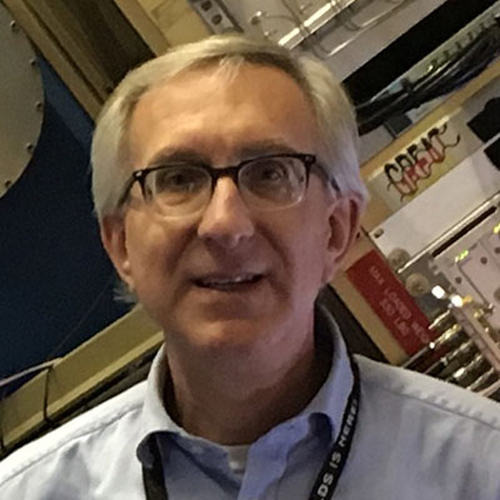Jeff Volosin

Professor of Practice
Astronautical EngineeringJeff Volosin is a Professor of Practice in Astronautical Engineering at Capitol Technology University. He has a 38-year career in the aerospace field between industry and government NASA experience. This includes 20 years in the industry and in senior leadership roles managing projects, programs, and divisions, rising from project to program manager and ultimately to the role of acting Vice President of Civil Space at Honeywell Technology Solutions, Inc. (HTSI). He has 18 years of Federal service as a NASA Project and Program Manager, as well as experience focused on the design, development and operations of NASA/NOAA robotic and crewed spacecraft. He served as a government Senior Executive for 6 years, and his 16-year civil service career was focused on flight project and program management, including his position as Associate Director of Earth Sciences Flight Projects. Other previous roles across the industry include Deputy Director of Astrophysics at NASA HQ, Deputy Director of Spacecraft Communications Networks, as well as Systems Engineer, Project Manager, Program Manager, corporate Vice President and a Senior Executive in leadership positions at NASA (both at NASA Headquarters as well as at Goddard Space Flight Center). A key to his success in each of these leadership roles has been his ability to engage and work effectively with key stakeholders in industry, government, international space agencies, and academia.
For 20 years, Jeff has served as an Adjunct Professor with Capitol Tech in Astronautical Engineering, and was the first adjunct professor of AE at our university. He currently teaches Spacecraft Systems and Systems Engineering in the undergraduate AE major and Systems Engineering in our EE major.
His expertise includes flight dynamics, satellite operations and communications networks, advanced space technology maturation. designing, constructing, testing and operating both robotic and human spacecraft as well as communication network development and operations, advanced technology research in laser communication, and human life support systems.
New technology in his field includes: 1) Miniaturization has led to a surge in small/micro-satellite development, 2) constellations of satellites working together have opened up new fields in science as well as in terrestrial communications with constellations such as Starlink, 3) advanced technologies in electric propulsion and laser communication are enabling satellites to return more data over increased lifespans, and 4) significant expansion in commercial space capabilities have shifted the center of the aerospace industry away from the traditional government-driven model.
When he is not teaching, he is working on a research project to develop a book on the history of NASA’s Explorers Program, playing piano, and working at a classic Corvette restoration shop.
Some advice that he gives to his students is - "Follow your passion – do you what you love – and – ask lots of questions of your professors to better understand what exciting career options might be available."
Areas of Expertise:
- Aerospace Science
- Systems Engineering
- Robotics and Spacecraft Design and Development
- Flight Dynamics
- Satellite Operations and Communications Networks
- Advanced Space Technology Maturation
- Human Life Support Systems
Biography:
Education
- B.S., Space Science, Florida Institute of Technology (1986)
Professional Achievements
- Member of initial NASA team to travel to Russia in 1993 to evaluate whether a joint US/Russian space station would be technically feasible
- NASA Lead for an effort to bring 14 space agencies from around the world together to craft a joint agreement on future Moon/Mars exploration
- Served as NASA’s human-mission-to-Mars lead
- Managed the $350M Transiting Exoplanet Survey Satellite (TESS) development effort
- Chaired numerous NASA Review Boards for science missions including the Hubble Telescope
- On-line instructor for a NASA/Saylor Systems Engineering course that had 7,000+ students worldwide
- Contributing author to one of the key aerospace engineering textbooks “Space Mission Engineering"
Certifications & Licenses
- Project/Program Manager Certification (FAC P/PM)
- Federal Senior Executive
Honors & Awards
- NASA Systems Engineering Excellence Award, 2024
- NASA Distinguished Service Medal, 2024
- NASA Silver Snoopy Astronaut Award, 2023
- NASA Silver Achievement Medal, 2019
- Robert Goddard Honor Award for Leadership, 2019
- Rotary NASA Leadership Award Nominee, 2019
- NASA Exceptional Leadership Medal, 2018
- NASA Exceptional Achievement Medal, 2017
- Honeywell Aerospace, President’s Award, 2008
- NASA Exceptional Service Medal, 2007
Research & Publications
Peer-Reviewed (Refereed) Publications
- “Space Mission Engineering: The New SMAD” textbook, Space Technology Library, ISBN 9781881883159, Contributing Author
- ‘It’s A Station Not A Ship,’ July 16, 2008, Washington Post.com, editorial on the role of the International Space Station.
- <“The L 98-59 System: Three Transiting. Terrestrial-Sized Planets Orbiting a Nearby M-dwarf” AAS16416R1, Jeffrey Volosin co-author, Veselin Kostov primary author.
- ‘Global Exploration Strategy, An International Effort,’ 2006, International Astronautical Congress, Valencia, Spain
- ‘Safety in Numbers, HTSI Approach to Planning for Leonids,’ 1999, Leonids Congress, Los Angeles, California.
- ‘An Integrated Product Team Approach to Flight Operations’, 1997, Second Annual Conference on Reducing the Cost of Satellite Operations, Oxford, England.
- ‘Shaping Up For the Final Frontier’, May 1993, National Space Society, Ad Astra Magazine.
- ‘Technology Planning for Long Range Utilization of Space Station Freedom’, 1993, Acta Astronautica, Vol 30, Pergamon Press Ltd.
- ‘Space Station Freedom, Life Sciences Research and the Space Exploration Initiative’, 1992, NASA publication.
- ‘On the Use of Space Station Freedom in Support of the Space Exploration Initiative, Life Sciences Research, 1992, International Astronautical Congress, Washington DC, IAF-92-0729.
- ‘The Romantic Age of Interplanetary Travel Research: Birth of the Space Exploration Initiative’, 1990, Goddard Memorial Essay Contest.
- ‘Reducing the Cost of Earth Observation Missions Through Standardization’, 1988, Earth Observation Symposium, AIAA Standards Department, Santa Barbara, California.
Volunteer/Service Experience
- NASA Lunabotics Competition, Volunteer Judge
- Former National Air & Space Museum Docent


